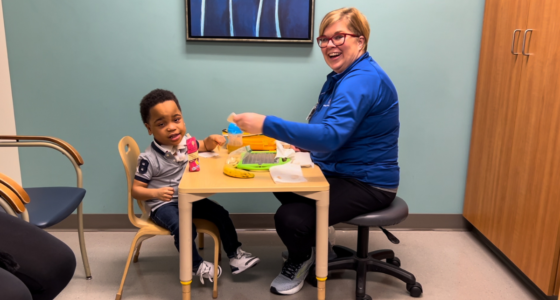
Children of all ages can experience a variety of feeding problems. Feeding problems can be caused by a child's dietary preferences or an underlying medical problem.
Issues and symptoms of feeding problems include:
- Being a picky eater (eating only certain foods)
- Being a slow eater
- Eating only foods with certain textures
- Eating only solid foods or liquids
- Gagging and choking issues when eating
Sometimes, feeding problems are due to a child's dietary preferences. Other times, the condition might indicate another underlying medical problem such as:
- Anatomic abnormalities of the gastrointestinal (GI) tract
- Aspiration (when foods, liquids or secretions enter the airway or lungs)
- Inflammation of the GI tract
- Swallowing problems
- Gastrointestinal mucosal conditions such as:
Prematurity and congenital conditions like cleft lip and palate, tracheomalacia and neurological disorders can cause feeding problems. Internationally adopted children who are born in an environment where they are only exposed to thickened liquids (e.g., China or Guatemala) may also develop feeding problems.
Diagnosis of Feeding Problems
If you answer "yes" to any of the following questions, your child may have a feeding problem:
- Does your child choke, cough or gag when drinking liquids?
- Does he or she play with the bottle or cup, taking a long time to finish it?
- Does your child limit the total amount he or she drinks per day?
- Does he or she sound congested or wheezy after drinking?
- Does he or she fight taking the bottle, turning his or her head away or pushing the bottle away?
If you are concerned about your child’s eating problems, you should discuss them with his or her doctor. If your child’s symptoms indicate certain feeding problems, a pediatric gastroenterologist will perform exams and tests to make a diagnosis.
Diagnostic exams and tests for feeding problems include:
- Keeping a four-day diet diary
- Fluoroscopy procedures such as an upper gastrointestinal (UGI) barium study or video feeding study
- An upper endoscopy
If your child's symptoms are severe, he or she will undergo a videofluoroscopic swallow study (VFSS) to make sure liquid or food is not going into the lungs. The Radiology & Imaging Department at Riley at IU Health conducts these studies. A speech pathologist will also take part in the study. A VFSS shows how well a patient drinks or eats and if he or she can swallow safely. If the study shows liquid going into the lungs (aspiration), this indicates a breathing or feeding problem. During the study, your child will sit in a feeding seat and drink formula with barium while a technician takes videos of the mouth, esophagus and breathing tube.
Treatments
Treatments
Treatment for feeding problems often depends on the underlying cause of the problem. If your child's symptoms are not severe, the doctor will try adjusting the thickness of liquids to minimize risk of aspiration. Additional treatment options include:
- Modifying the texture of foods
- Gastrointestinal tube (feeding tube)
- Modifying the types of foods allowed
- Speech-language pathology
The doctor will recommend a treatment plan that addresses the underlying cause of the feeding problem and is tailored to your child's unique needs.
Ways to Thicken Your Baby's Formula
To thicken your baby's formula, add 1 tablespoon of baby oatmeal cereal to every 2 ounces of formula, and feed with a crosscut nipple or high-flow bottle system. If you are making a big batch of formula for the day, make sure you add the cereal each time you make a bottle—the cereal dissolves over time, making it less effective.
TIPS
- Use a commercial thickener such as SimplyThick, Thick-It or Hydra-Aid.
- You can thicken juice by adding 5 tablespoons of applesauce to 2 ounces of juice.
- Add 1 tablespoon of instant powdered pudding mix to every 2 ounces of milk. Wait a few minutes for thickening.
- A typical child's yogurt drink is usually a thick consistency.
Often times, doctors at Riley at IU Health will have children practice their thin-liquid skills with water in a regular flow drinking system (e.g., a regular flow bottle system or Rubbermaid straw cup).
Key Points to Remember
Key Points to Remember
- Children can develop feeding problems at any age.
- Feeding problems can be caused by a child's dietary preferences or an underlying medical problem.
- If you are concerned about your child’s feeding problems, talk to a physician.
Support Services & Resources
Support Services & Resources
Visit the websites below to find support groups and services and learn more about feeding problems in children.
We offer a broad range of supportive services to make life better for families who choose us for their children's care.
This website provides extensive information about the causes of feeding problems and how to care for patients with the condition.
Feeding Problems Research
Feeding Problems Research
The pediatric gastroenterologists at Riley at IU Health participate in research projects that examine the various causes of feeding problems. Ask your child's doctor for more information about these studies.
Locations
Locations
Locations
In addition to our primary hospital location at the Academic Health Center in Indianapolis, IN, we have convenient locations to better serve our communities throughout the state.
Departments Treating This Condition
Related Stories
Related Stories

Speech-language pathologist helps children with feeding problems
Tara Quirke, a speech-language pathologist at IU Health North, has worked at the hospital since it opened. She works with pediatric patients, from newborns to teenagers. Her focus areas are feeding...
Continue reading
